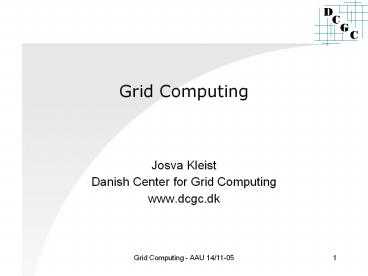Grid Computing - PowerPoint PPT Presentation
Title: Grid Computing
1
Grid Computing
- Josva Kleist
- Danish Center for Grid Computing
- www.dcgc.dk
2
The ATLAS experiment
3
Agenda
- E-science
- Grid Computing
- An example Grid NorduGrid ARC
- Demo
- Internals of NorduGrid
- Future
4
E-science
Science (increasingly) done through distributed
global collaborations enabled by the Internet,
using very large data collections, tera-scale
computing resources and high performance
visualisation.
5
E-science the old fashioned way
6
The grand vision
- A huge virtual distributed computer.
7
Definition 1
- A computational grid is a hardware and software
infrastructure that provides dependable,
consistent, pervasive, and inexpensive access to
high-end computational capabilities.
The Grid a blueprint for a new computing
infrastructure, 1998
8
Definition 2
- The real and specific problem that underlies
the Grid concept is coordinated ressource sharing
and problem solving in dynamic,
multiinstitutional virtual organizations. The
sharing that we are concerned with is not
primarily file exchange but rather direct access
to computers, software, data, and other
resources, as is required by a range of
collaborative problem solving and
resource-brokering strategies emerging in
industry, science, and engineering. This sharing
is, necessarily, highly controlled, with resource
providers and consumers defining clearly and
carefully just what is shared, who is allowed to
share, and the conditions under which sharing
occurs. A set of individuals and/or institutions
defined by such sharing rules form what we call a
virtual organization.
The anatomy of the Grid, 2000
9
Keysentences
- coordinates resources that are not subject to
centralized control - using standard, open, general-purpose protocols
and interfaces - to deliver nontrivial qualities of service.
10
Challenges
- Make hardware owned by different organizations
available to non-members of that organization. - In such a way that normal operation of the
equipment can continue. - In such a way that the organization still can
control who gets access. - In such a way that we can control who gets access
to specific pieces of data. - In such a way that operations can be performed
anonymously. - And still charge for the use of hard- and
software.
11
Challenges
- Resource allocation and scheduling
- Authentication and authorization
- Protection
- Control
- Accounting
12
Globus
- An open source software toolkit used for building
grids. - Includes software services and libraries for
resource monitoring, discovery, and management,
plus security and file management.
Web www.globus.org
13
The globus model
14
NorduGrid
- NorduGrid is a collaboration between a number of
universities mostly located in the Nordic
contries. - NorduGrid Advanced Resource Connector is
- A Globus-based Grid middleware solution of choice
in Scandinavia and Finland - NorduGrid is a production Grid
- Approximately 5000 CPUs
- Approximately 75 TB of storage
Web www.nordugrid.org
15
ARC Components
16
Workflow
RC
SE
Gatekeeper GridFTP
SE
Front-end
Cluster
UIRB
Grid Manager
MDS
Source NorduGrid.org
17
Front-end
18
The user-interface
- ngsub to submit a task
- ngstat to obtain the status of jobs and
clusters - ngcat to display the stdout or stderr of a
running job - ngget to retrieve the result from a finished
job - ngkill to cancel a job request
- ngclean to delete a job from a remote cluster
- ngrenew to renew users proxy
- ngsync to synchronize the local job info with
the MDS - ngcopy to transfer files to, from and between
clusters - ngremove to remove files
19
Broker
- The user must be authorized to use the cluster
and the queue - The clusters and queues characteristics must
match the requirements specified in the xRSL
string (max CPU time, required free disk space,
installed software etc) - If the job requires a file that is registered in
a Replica Catalog, the brokering gives priority
to clusters where a copy of the file is already
present - From all queues that fulfills the criteria one is
chosen randomly, with a weight proportional to
the number of free CPUs available for the user in
each queue - If there are no available CPUs in any of the
queues, the job is submitted to the queue with
the lowest number of queued job per processor
20
Demo
21
To-do
- Better resource brokering.
- Accounting.
- Scheduling.
- Security.
- Monitoring.































